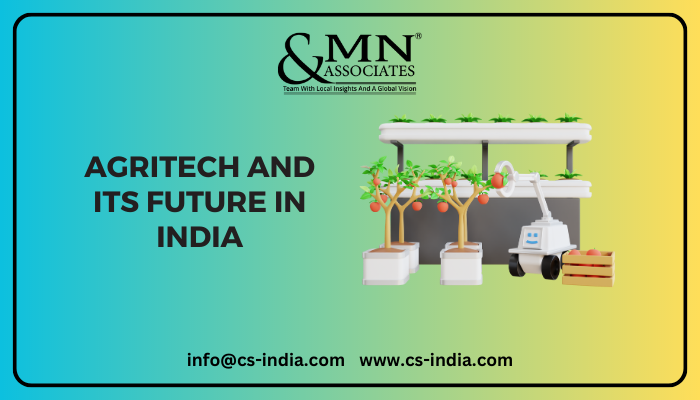
AgriTech and Its Future in India
Agritech startups moving from a traditional approach have witnessed a shift towards the digital tech-first approach in the last five years. The sector which contributes nearly half of the country’s GDP is on a path to manifold surface growth with the use of technology. In the last few years, enabling several technology initiatives in the bioresearch and farming disciplines, the government and private sector is strategizing for a great partnership to build a digital infrastructure for the farmers.
Addressing several inefficiencies in the traditional models of agriculture, several startups and young entrepreneurs are coming up with more disruptive and scalable business models that can enhance the Agri value chain and remove roadblocks of extreme agro-wastage. Actively encouraging stakeholders, the Indian government is proactively working towards reducing farmer illiteracy and finding ways for incorporating digitization means to improve their yield and efficiency.
To leverage more of their capabilities and for the coming generations to participate in the sector boom towards a tech approach, the government also introduced a Digital Agriculture Mission in September 2021, where more and more agri-tech startups were invited to get a view of cloud computing, remote sensing, AI Data models and earth observations with Machine learning which could assist them to explore the industry and its opportunities more.
How is Agritech in India Emerging?
The vision of the Government for the Indian agriculture sector is to create a knowledge space for the farmers, where adapting to ongoing innovations those accepted in the real estate and industrial sector also become a boon for the agriculture sector with their acceptance and understanding. Agritech will target the core problems of the sectors faced due to traditional value chains /methodology and will bring tech-driven improvements in overall setup considering:
- Connectivity of Market: The agritech is more focused on leaning the path of producers to the end consumers, through seamless connectivity and integrated value chain systems based on cloud options. With tech improvement, agro-based manufacturers will be able to maintain their quality standards and will remain in connectivity with the producers for their demands.
- Farming with Tech Essentials: With the use of technology, analogy, and sensor imagery, it will be easier for producers to take control over their production and for deciding the crop yield at a particular point of time than depending on obsolete data or beliefs.
Agritech companies are now focusing more on conducting high-value surveys and collecting imprints for constructing valuable information for aligning irrigation, proper fertilization, and crop rotation through the use of technology.
- Outsourced setups: With the use of Machine learning and Resource engineering techniques several startups are focusing on building solutions for farmers and producers to know the potential of their tools, equipment, and vehicles to study them in real-time about their performance in a particular season of harvest.
Through Agritech, where the major problem for the producer was related to handling and maintenance of their vehicles, cloud-based outsourcing entities are yielding revenue just by renting vehicles to the needy and also generating income for those who want to lend their vehicles.
- Harvest Optimisation: Wastage of produce, transportation, and processing of foods is another concept looked over into the Agritech technology where programmatic CRM systems, chain movement systems, and connectivity options are being considered to reduce the handling issues of harvest.
Automation with end-to-end visibility, along with the inclusion of e-commerce and Q-commerce is the ultimate goal to work with tech in the Agriculture sector.
Role of AI, Machine Learning, and Blockchain Technology in Augmentation of Agritech
With AI and Machine learning approaches made for agriculture research, it was observed that technology can certainly improve the efficiency of farmers and those involved in the value chain in building soil quality, detecting pests in crops, standardizing food quality, and monitoring labor involvement.
Through the use of ML, Blockchain, and AI, farmers and tech geeks are putting efforts to alleviate the crucial issues of agriculture and agro-business. With AI, more predictive models, data traceability options, reduced spoilage, automation option, and predictive planning options have been created reducing chances of pre-post harvest damage and wastage.
With the use of blockchain, better data transparency has been built improving trade in the global food ecosystem. Blockchain to Agritech has strategized the ways to manage adherence to food standards and how growth anticipations can be done with the current production levels.
Future Prospects of Agritech in India
The government’s vision for the Indian economy and the agriculture sector is to make it completely technology is driven by enhancing the skills of the farmers and even empowering the youth to make more technology-driven initiatives for scaling the agro production of the country.
With accepting the global innovations to reach Indian farmers, the government is also undertaking building pillars for the tech industry to build more Sustainable options for improving the digital public farming infrastructure.
As per the Economic Survey 2022-23, the Agritech Sector has grown to nearly 4.6 percent in the last 6 years and more than 1000 agritech startups are working in a positive light for improving the lives of farmers and simplifying agriculture needs. The Agriculture Infrastructure Fund is also supporting more and more tech units and will bring more opportunities for fresh ideas to get their concept into reality. More allocations from the Government will be done for scaling investment in Agritech startups both recognized and under R&D to provide them with digital infrastructural aid.
Seek help for legal compliances needed to start your agritech today,
drop us a line at info@cs-india.com
